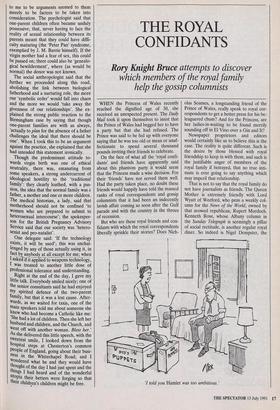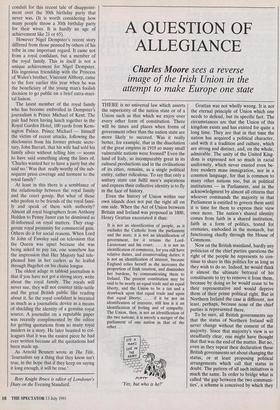THE ROYAL CONFIDANTS
Rory Knight Bruce attempts to discover
which members of the royal family help the gossip columnists
WHEN the Princess of Wales recently reached the dignified age of 30, she received an unexpected present. The Daily Mail took it upon themselves to insist that the Prince of Wales had begged her to have a party but that she had refused. The Prince was said to be fed up with everyone saying that he was too old or mean or unaf- fectionate to spend several thousand pounds inviting their friends to celebrate.
On the face of what all the 'royal confi- dants' and friends have apparently said about this phantom party it would seem that the Princess made a wise decision. For their 'friends' have not served them well. Had the party taken place, no doubt these friends would happily have told the massed ranks of royal correspondents and gossip columnists that it had been an indecently lavish affair coming so soon after the Gulf parade and with the country in the throes of recession.
But who are these royal friends and con- fidants with which the royal correspondents liberally sprinkle their stories? Does Nich- olas Soames, a longstanding friend of the Prince of Wales, really speak to royal cor- respondents to get a better press for his be- leaguered chum? And for the Princess, are her ladies-in-waiting to be found merrily sounding off in El Vino over a Gin and It?
Newspaper proprietors and editors would certainly like us to believe this is the case. The reality is quite different. Such is the desire by those blessed with royal friendship to keep in with them, and such is the justifiable anger of members of the royal family if betrayed, that no true inti- mate is ever going to say anything which may imperil that relationship.
That is not to say that the royal family do not have journalists as friends. The Queen Mother is extremely friendly with Lord Wyatt of Weeford, who pens a weekly col- umn for the News of the World, owned by that avowed republican, Rupert Murdoch. Kenneth Rose, whose Albany column in the Sunday Telegraph is seemingly a pillar of social rectitude, is another regular royal diner. So indeed is Nigel Dempster, the told you Hamlet was too ambitious.' conduit for this recent tale of disappoint- ment over the 30th birthday party that never was. (It is worth considering how many people throw a 30th birthday party for their wives. It is hardly an age of achievement like 21 or 65).
However Nigel Dempster's recent story differed from those penned by others of his tribe in one important regard. It came not from a royal confidant, but a member of the royal family. This in itself is not a unique achievement for Nigel Dempster. His ingenious friendship with the Princess of Wales's brother, Viscount Althorp, came to the fore earlier this year when he was the beneficiary of the young man's foolish decision to go public on a brief extra-mari- tal liaison.
The latest member of the royal family who has become embroiled in Dempster's journalism is Prince Michael of Kent. The pair had been having lunch together in the Royal Garden Hotel, 100 yards from Kens- ington Palace. Prince Michael — himself the victim of recent attacks, following the disclosures from his former private secre- tary, John Barratt, that his wife had sold his family silver without telling him — seems to have said something along the lines of, 'Charles wanted her to have a party but she said no.' Was that really worthy of the sub- sequent press coverage and torment to the royal family?
At least in this there is a semblance of the relationship between the royal family and the court gossip. But what of those who profess to be friends of the royal fami- ly and speak of them with authority? Almost all royal biographers from Anthony Holden to Penny Junor can be dismissed as ill-informed on royal matters. They exag- gerate royal proximity for commercial gain. Others do it for social reasons. When Lord St John of Fawsley said on television that the Queen was upset because she was being asked to pay tax, one somehow has the impression that Her Majesty had tele- phoned him in her curlers as he leafed through Bagehot on his chaise longue.
The oldest adage in tabloid journalism is that if you have not got a strong story, write about the royal family. The royals will never sue, they will not counter tittle-tattle and the great British public like reading about it. So the royal confidant is invented as much as a journalistic device as a means of shielding the identity of a genuine royal source. A journalist on a reputable paper was recently complimented by the editor for getting quotations from so many royal insiders in a story. He later boasted to col- leagues that it was the easiest piece he had ever written because all the quotations had been made up.
As Arnold Bennett wrote in The Title, 'Journalists say a thing that they know isn't true, in the hope that if they keep on saying it long enough, it will be true.'
Rory Knight Bruce is editor of Londoner's Diary on the Evening Standard.



















































 Previous page
Previous page